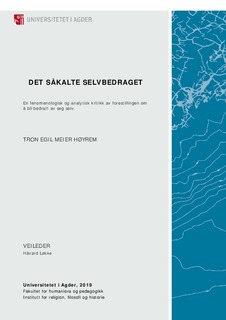| dc.contributor.author | Høyrem, Tron Egil Meier | |
| dc.date.accessioned | 2019-12-11T12:24:40Z | |
| dc.date.available | 2019-12-11T12:24:40Z | |
| dc.date.issued | 2019 | |
| dc.identifier.uri | http://hdl.handle.net/11250/2632738 | |
| dc.description | Masteroppgave religion REL500 - Universitetet i Agder 2019 | nb_NO |
| dc.description.abstract | Understanding self-deception, the way this term is still applied, has prompted both philosophers, psychologists and others in finding solutions to the dilemma by suggesting theories as to the construction of and motivation behind the phenomenon. Some of these theories compromise the core issue - that p and ~p cannot be true at the same time. Other theories work around the dilemma by offering rather dubious assumptions like boundaries between parts of the mind.My suggestion is a rather clear-cut definition by which self-deception is congruent with Moor's paradox. The self-deception then disappears because the contradiction is cast aside in favour of an intuitive inference. This is argued both from a phenomenological and an analytical point of view. Analysing the interaction between intuition and reason David Kahneman's "System 2", reasoning, displays in an appropriate way how reason just is a wingman as long as intuition successfully plays the ball. Yet I have considered to some extent biases regularly emerging reasoning, even when facing relatively straightforward decisions and premises.Bringing in Embodied Cognition for a more holistic view of our mental processes, this theory found foothold at Merleau-Ponty, and I have sought to demonstrate how intuitions in their capacity of essential premises for our attitudes and decisions are intelligible both within a Heideggerian Be-ing perspective and under Merleau-Pontys "intentional arc". Alternatively intuition is considered in light of Heideggers view on art and truth from 1933 on.Abandoning "self-deception" by recognising really motivating factors is hard; sometimes seemingly impossible. Discovering original causality for one thing and judging arguments for another. Cognitive abilities are sometimes hijacked by our feelings. Considerations put on hold; even expelled. Moor's paradox no longer on the agenda.Contemplating decisions made og attitudes exposed reveal unexpected facets and we are alienated from our 'selves' - observed from a distance.Nobody to blame, we resort to the second best; we fooled ourselves. We were subject to self-deception.Finally establishing identity, manipulating facts and our need of an intelligent and coherent narrative of ourselves are pinpointed as accounts for intuitions successfully overriding reason. | nb_NO |
| dc.language.iso | nob | nb_NO |
| dc.publisher | Universitetet i Agder ; University of Agder | nb_NO |
| dc.rights | Attribution-NonCommercial-NoDerivatives 4.0 Internasjonal | * |
| dc.rights.uri | http://creativecommons.org/licenses/by-nc-nd/4.0/deed.no | * |
| dc.subject | REL500 | nb_NO |
| dc.title | Det såkalte selvbedraget : En fenomenologisk og analytisk kritikk av forestillingen om å bli bedratt av seg selv | nb_NO |
| dc.type | Master thesis | nb_NO |
| dc.subject.nsi | VDP::Humaniora: 000::Filosofiske fag: 160::Filosofi: 161 | nb_NO |
| dc.source.pagenumber | 101 s. | nb_NO |

